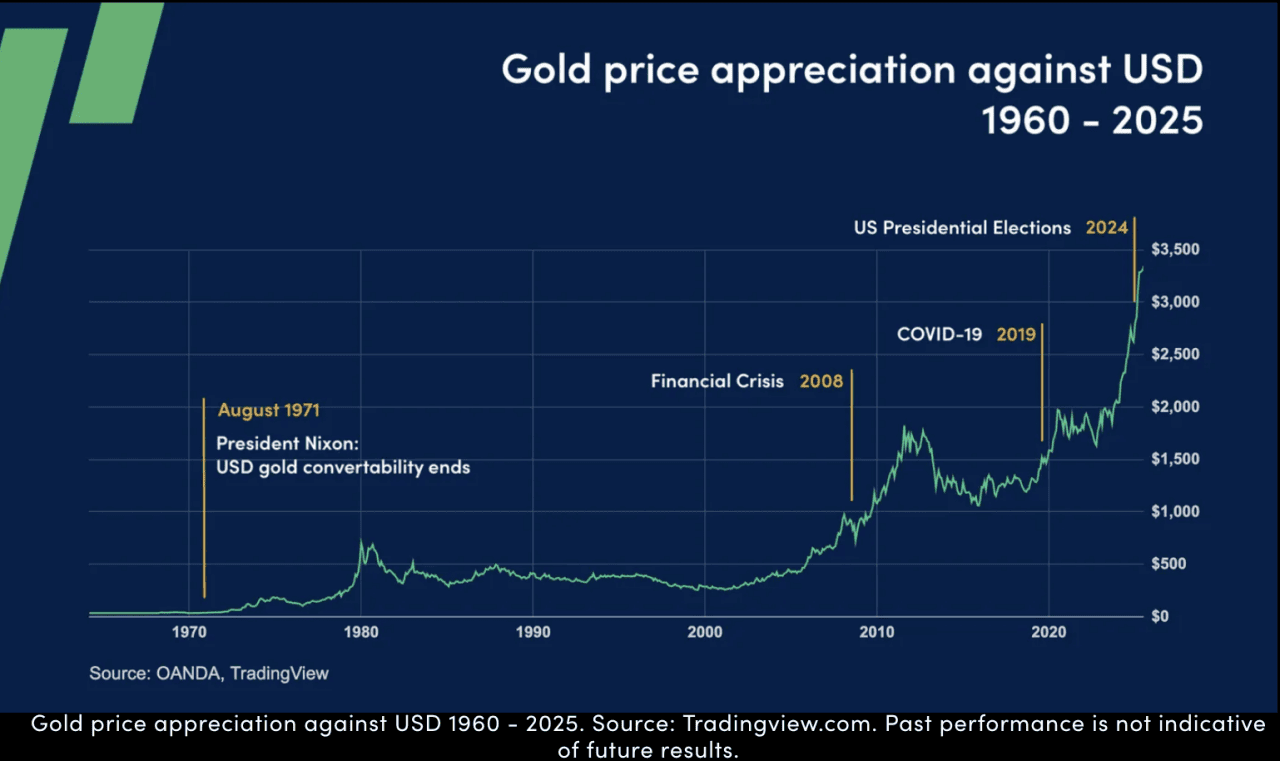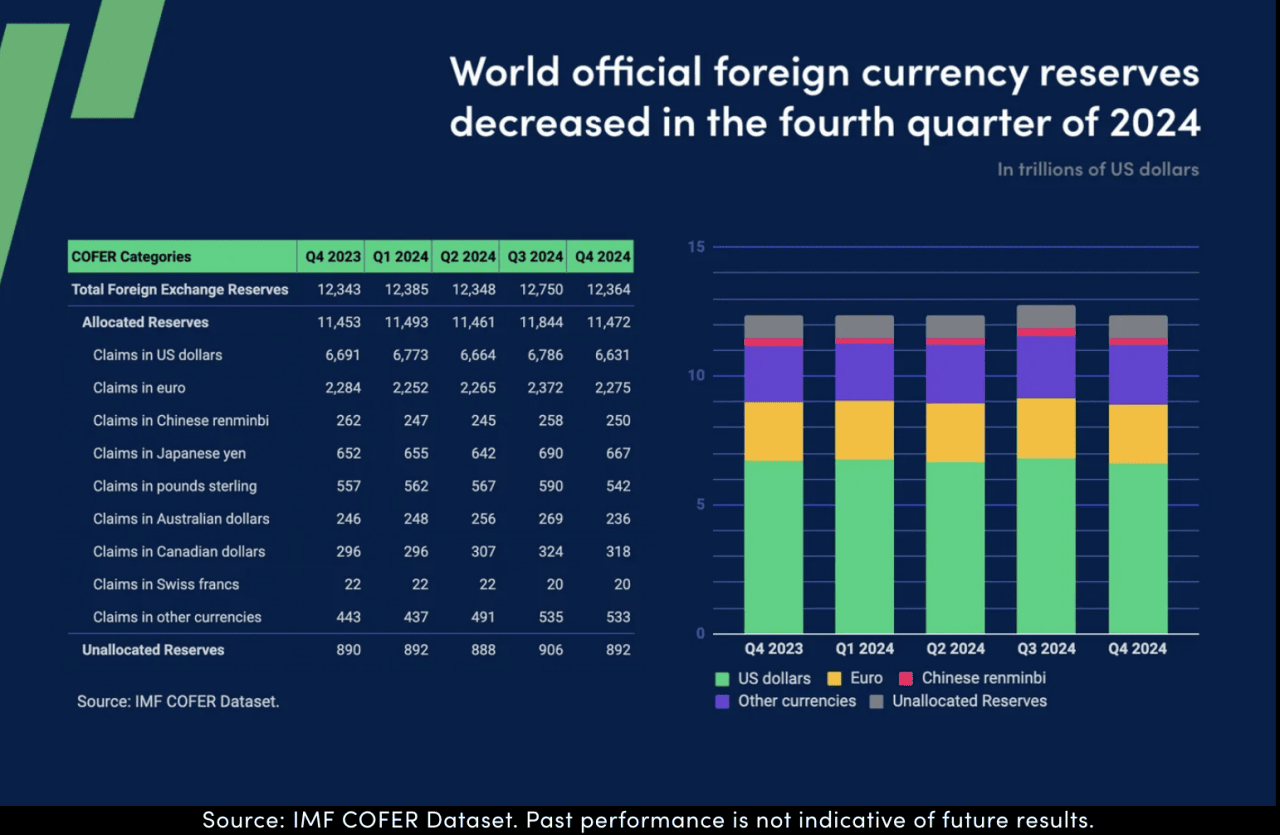
July 28, 2025
The U.S. greenback has lengthy been the undisputed heavyweight champion of worldwide finance.
May America lose the worldwide forex race?
Perceive the historic dominance of the U.S. greenback, the rising threats from geopolitical shifts and digital currencies, and the profound implications if America’s world financial affect wanes.
The U.S. greenback has lengthy been the undisputed heavyweight champion of worldwide finance, serving because the world’s major reserve forex and the bedrock for worldwide commerce and funding. Its enduring dominance is deeply rooted in a wealthy historical past, the sheer dimension and stability of the American financial system, and the strong infrastructure of its monetary markets. But, because the twenty first century unfolds, this formidable place faces unprecedented challenges from geopolitical shifts, the rise of financial rivals, and transformative technological developments, comparable to digital currencies. OANDA explores the foundations of the greenback’s energy, the forces testing its supremacy, and the potential implications ought to its world financial affect wane.

The U.S. greenback’s historical past is deeply linked to the financial and political improvement of the US. Initially, varied currencies circulated inside the colonies. The Coinage Act of 1792 formally established the greenback as the usual unit of forex in the US. The Federal Reserve, created in 1913, additional solidified the greenback’s function within the nation’s financial system. A key turning level was the Bretton Woods Settlement in 1944, which made the greenback the world’s major reserve forex. Beneath this method, different currencies have been pegged to the greenback, which was in flip linked to gold. When the Bretton Woods system collapsed in 1971, the period of floating trade charges started, during which market forces decided the worth of the greenback. Regardless of going through challenges and fluctuations over time, the greenback has maintained its dominant place in world finance as a key reserve and transaction forex.

A reserve forex is one held in vital portions by central banks and monetary establishments as a part of their international trade reserves. It’s used for worldwide transactions and investments, in addition to a benchmark for world commerce. Probably the most fascinating reserve currencies are these perceived as secure, liquid, and backed by giant, trusted economies.
The U.S. greenback suits these standards virtually completely. As of 2024, the U.S. greenback accounts for roughly 57.8% of worldwide international trade reserves, in line with the Worldwide Financial Fund (IMF). The euro is second at 19.8%, adopted by the Japanese yen at 5.82%, the British pound at 4.73%, and, more and more, the Chinese language yuan at 2.18%.
- Financial dimension and stability: The USA has the world’s largest financial system, underpinned by deep monetary markets and comparatively sturdy establishments.
- Petrodollar system: For the reason that Nineteen Seventies, most world oil transactions have been priced and carried out in US {dollars}, reinforcing demand throughout energy-importing nations.
- Treasury markets: U.S. authorities bonds (treasuries) are thought of a haven, and their large and liquid markets supply world traders a dependable place to park their reserves.
- World commerce and finance infrastructure: Many world contracts, loans, and commodities are denominated in {dollars}. U.S.-based monetary establishments and techniques (like SWIFT and CHIPS) are foundational to worldwide banking.
- China’s rise: The Chinese language yuan (renminbi) is being step by step internationalized. Initiatives such because the Belt and Highway Initiative and the creation of the Cross-Border Interbank Fee System (CIPS) are a part of a long-term technique to scale back dependence on the greenback.
- De-dollarization efforts: International locations comparable to Russia, Iran, and, extra lately, Brazil and India have taken steps to scale back their use of the greenback in commerce, usually motivated by geopolitical issues or a concern of US sanctions. Referred to as the BRICS nations, the group is actively pursuing de-dollarization, aiming to scale back its reliance on the US greenback.
- Central Financial institution Digital Currencies (CBDCs): Digital variations of sovereign currencies may, sooner or later, streamline cross-border transactions and diminish the greenback’s fee infrastructure benefits.
- U.S. fiscal issues: Excessive nationwide debt, persistent funds deficits, and political dysfunction in Washington increase issues in regards to the long-term stability of the greenback.
- Decrease borrowing prices: Excessive world demand for dollar-denominated property permits the US authorities to borrow at comparatively low rates of interest.
- World affect: Sanctions and monetary restrictions enforced in {dollars} have a disproportionate impression on international governments and establishments.
- Commerce flexibility: The U.S. can run persistent commerce deficits with out going through the forex crises that growing international locations sometimes encounter.
With all that mentioned, the monetary panorama is continually evolving, and new contenders are rising that might reshape the way forward for world forex. Amongst these, the rise of cryptocurrencies presents a novel problem to the established order, prompting questions on their potential to disrupt the greenback’s long-standing dominance.
Central banks globally are approaching cryptocurrencies with a mixture of warning and strategic curiosity. Many are exploring or growing their very own Central Financial institution Digital Currencies (CBDCs) to keep up financial sovereignty, enhance fee techniques, and counter the potential disruption from non-public stablecoins. As an example, the European Central Financial institution (ECB) has urged the European Union to expedite laws for a digital euro, highlighting issues that large-scale non-public stablecoins may pose a risk to financial stability. Whereas recognizing the progressive potential of blockchain know-how, central banks usually purpose to combine digital property right into a regulated monetary framework relatively than permitting them to function solely exterior of their oversight.
The rising stress between government-backed digital currencies (Central Financial institution Digital Currencies – CBDCs) and decentralized cryptocurrencies stems from basic variations of their design, management, and implications for monetary techniques and particular person freedoms.
- Centralized management: CBDCs are issued and managed by a nation’s central financial institution. This provides the federal government full oversight and management over the forex’s provide, transactions, and person information.
- Financial coverage device: Governments view CBDCs as a way to reinforce the effectiveness of financial coverage, facilitate sooner and cheaper funds, and doubtlessly cut back reliance on money.
- Monetary stability: Proponents argue that CBDCs can improve monetary stability by offering a safe, state-backed digital asset and facilitating the monitoring of illicit financial actions.
- Privateness issues: A major level of stress is the potential for lowered privateness, as transactions could possibly be absolutely traceable by the federal government, elevating issues about surveillance and monetary censorship.
- Disruption of business banks: The introduction of CBDCs may bypass conventional business banks, impacting their function within the monetary system and doubtlessly resulting in disintermediation.
- Decentralized management: Cryptocurrencies function on a distributed ledger know-how (blockchain) and should not managed by any central authority, authorities, or monetary establishment.
- Anonymity/pseudonymity: Whereas not actually nameless, many cryptocurrencies supply a level of pseudonymity, permitting customers to transact with out revealing their real-world identities, which privateness advocates extremely worth.
- Freedom from authorities interference: A core attraction of decentralized crypto is its resistance to authorities censorship, seizure, or inflation, as its provide is commonly algorithmically decided and transactions are peer-to-peer.
- Volatility and regulation: Decentralized cryptocurrencies are sometimes extremely unstable and largely unregulated, posing dangers to traders and making it difficult for governments to combine them into present monetary frameworks.
- Problem to financial sovereignty: The existence and rising adoption of decentralized cryptocurrencies might be seen as a problem to a nation’s financial sovereignty and management over its monetary system.
In essence, the battle is a contemporary manifestation of the wrestle between state management and particular person liberty within the digital age, performed out within the realm of finance. As each CBDCs and decentralized cryptocurrencies proceed to develop, this stress is more likely to intensify, shaping the way forward for world finance.
- Financial stability and prosperity: The U.S. greenback’s function as the first reserve forex implies that world commerce, finance, and funding primarily revolve round it. A diminished function for the greenback may result in elevated volatility in trade charges, greater transaction prices for U.S. companies and customers, and a much less predictable world financial setting, doubtlessly impacting US financial development and employment.
- Borrowing prices and monetary well being: The US advantages from its capability to borrow at comparatively low rates of interest as a result of greenback’s standing as a haven and the deep liquidity of U.S. treasury markets. A decline in financial affect may result in greater borrowing prices for the U.S. authorities and firms, exacerbating nationwide debt and doubtlessly limiting fiscal flexibility to reply to financial downturns or put money into crucial areas.
- Geopolitical leverage: Financial affect interprets straight into geopolitical energy. The U.S. has traditionally used its monetary leverage (e.g., by sanctions and management over world monetary establishments like SWIFT) to advance its international coverage targets. Dropping this affect would diminish its capability to exert stress on different nations and will alter the worldwide steadiness of energy.
- Management over the worldwide monetary system: The U.S. has performed a number one function in shaping world monetary rules and establishments. A lack of financial affect may imply that different nations or blocs, doubtlessly with totally different values and pursuits, take the lead in setting the foundations for the worldwide monetary system, which could not align with US pursuits.
- Impression on U.S. customers and companies: Individuals may expertise direct impacts, comparable to greater costs for imported items if the greenback weakens considerably, and elevated uncertainty for companies engaged in worldwide commerce. U.S. corporations working globally may face extra advanced and dear forex conversions.
- Function in innovation and monetary know-how: If different international locations or decentralized techniques change into the first drivers of monetary innovation, the U.S. dangers falling behind in essential areas, comparable to digital funds, cross-border transactions, and new monetary devices. This might hinder its aggressive edge within the world financial system.
- Belief and confidence: A lack of management would signify a decline in world belief and confidence within the U.S. monetary system and its governance. This erosion of confidence may have long-term repercussions extending past financial affect, affecting diplomatic relations and worldwide cooperation on a number of fronts.
In essence, a decline within the U.S.’s world financial affect wouldn’t simply be an financial shift however a basic reordering of energy, with vital implications for the U.S. financial system, its international coverage, and its standing on the planet.
The U.S. greenback has undeniably remained the bedrock of the worldwide monetary system for many years, bolstered by a robust financial system, huge treasury markets, and its pivotal function in worldwide commerce. Nevertheless, the emergence of rival currencies and, extra considerably, the disruptive potential of digital property, comparable to cryptocurrencies and central financial institution digital currencies, alerts a shifting panorama. Whereas central banks and regulators grapple with integrating these improvements into established frameworks, the stress between centralized management and decentralized freedom persists. The way forward for world financial affect will not be a foregone conclusion; how the U.S. adapts to those challenges will decide whether or not the greenback maintains its formidable place or if a brand new period of multipolar monetary energy begins. The stakes are excessive, impacting not simply economies but additionally geopolitical leverage and the day by day lives of residents worldwide.
This text is for basic info functions solely, to not be thought of a suggestion or monetary recommendation. Previous efficiency will not be indicative of future outcomes. This isn’t funding recommendation or a suggestion to purchase or promote monetary devices.
Opinions are the authors’; not essentially these of OANDA Company or any of its associates, subsidiaries, officers or administrators.
This story was produced by OANDA and reviewed and distributed by Stacker.
RELATED CONTENT: TikTok-Fueled Boycott Exposes Deep Divide Between Black Individuals and Africans; It’s Time To Knock It Off

